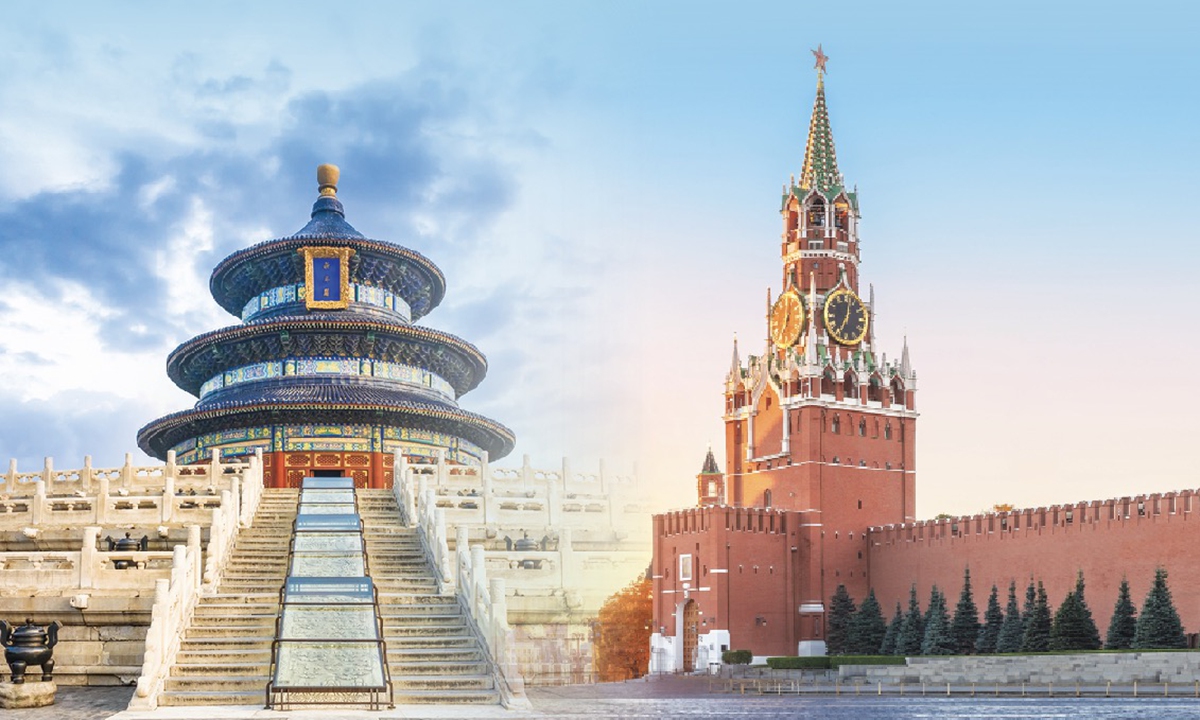
The Temple of Heaven in Beijing (left) and Moscow Kremlin’s Spasskaya Tower. Photos: VCG
Editor’s Note:
This year marks the 75th anniversary of the establishment of diplomatic ties between China and Russia. Before Russian President Vladimir Putin’s state visit to China scheduled from May 16 to 17, Global Times reporter
(GT) Xia Wenxin, Yang Sheng and Yang Ruoyu exclusively spoke with the Chinese Ambassador to Russia Zhang Hanhui
(Zhang) on the development of the relationship between the two countries, the Ukraine crisis and China-Russia cultural exchanges, among other topics.
GT: Russia’s President Vladimir Putin was formally sworn in on May 7 and chose China as the destination of his first foreign trip after his inauguration. What are your expectations for President Putin’s visit to China? This year is the 75th anniversary of the establishment of diplomatic relations between China and Russia, what new opportunities will the future development of China-Russia relations bring to the two countries?
Zhang: Under the strategic guidance of President Xi Jinping and President Putin, the comprehensive strategic partnership of coordination for a new era between China and Russia is currently in its best historical period. Not long ago, President Xi sent a congratulatory message to President Putin when the latter was re-elected, highlighting the close friendship and political mutual trust between the leaders of the two countries.
China and Russia are both major powers and permanent members of the United Nations Security Council and adhere to the principle of non-alliance, non-confrontation and non-targeting of any third party. They continue to deepen their friendly relations and strategic cooperation to create a new paradigm of major-country relations that is completely different from the Cold War era. Over the past 75 years of diplomatic relations, the political mutual trust between the two countries has continued to deepen, and the results of mutually beneficial cooperation have been fruitful, with increasing people-to-people exchanges and close international cooperation.
Last year, the trade volume between China and Russia reached a historic high of over $240 billion, with “Made in China” products becoming increasingly popular and trusted by Russian consumers. Meanwhile, Russian agricultural and seafood products are selling well in China, fully demonstrating the strong resilience and broad prospects of mutual cooperation between the two countries. Maintaining and developing the relationship between China and Russia meets the common expectations of the two peoples and is in line with the trend of global development, with important implications for maintaining global strategic stability and promoting positive interactions among major countries.
As this year marks the 75th anniversary of establishing diplomatic relations, China and Russia will further strengthen strategic cooperation, cultivate new momentum for cooperation and help each other achieve development and revitalization. The two countries will also continue to enhance international multilateral cooperation, practice true multilateralism and make contributions to the security and stability of both countries and the world.
GT: Switzerland will host a high-level international conference in June to discuss the Russia-Ukraine crisis, but Russia said it is not invited. Do you think it’s overly optimistic to expect a cease-fire in the current conflict to be reached? What are the biggest obstacles to reaching an agreement? Some voices in the West believe that Russia’s strategic partnership with China is the source of confidence for Russia to continue this conflict. What is your take on this?
Zhang: In regard to the Ukraine crisis, China has always adhered to an objective and just position, always standing on the side of peace and dialogue, actively advocating for peace and promoting talks. President Xi has put forward four principles, called for joint efforts in four areas and shared three observations on Ukraine which outline China’s fundamental approach to the issue.
Unfortunately, there is still no sign of a cease-fire in the current crisis, and the conflict is still escalating and expanding. The parties involved are not willing to budge on their positions, with significant differences in understanding. Some external forces are still adding fuel to the fire and fanning the flames.
History has proven that the end point of any conflict is the negotiating table. China supports the timely convening of an international conference recognized by both Russia and Ukraine, with equal participation of all parties and fair discussion of all peace proposals. China is willing to continue to play its unique role and contribute Chinese wisdom and strength to promote a political solution to the Ukraine crisis.
The China-Russia comprehensive strategic partnership of coordination for a new era has never targeted any third party, nor does it tolerate any third party interference or coercion. China is neither the creator of the Ukraine crisis nor a party to it. China firmly rejects groundless accusations over the normal trade and economic exchanges between China and Russia, under excuses of the Ukraine crisis. We will firmly defend the legitimate rights and interests of our enterprises. At the same time, we advise relevant countries to stop shifting blame on China and make real efforts to politically resolve the Ukraine crisis.
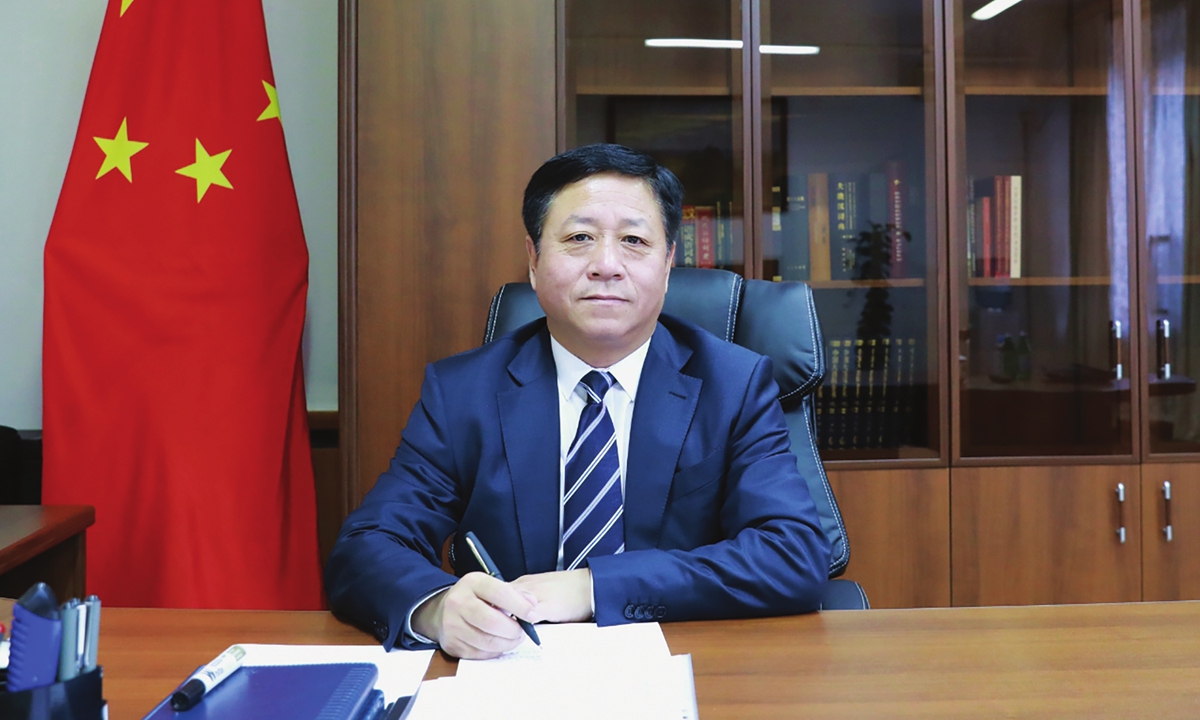
Zhang Hanhui. Photo: Courtesy of Chinese Embassy in Russia
GT: Over the past two years, the US and some Western countries have imposed sanctions and long-arm jurisdiction on Russia. What impacts do these measures have on foreign companies operating in Russia, including Chinese companies?
Zhang: China opposes any form of unilateral sanctions and long-arm jurisdiction that have no basis in international law. Implementing economic sanctions not only fails to solve security issues, but also harms the normal lives of the people in the relevant countries, disrupts the global market and worsens the already slowing world economy.
China and Russia are natural partners with a strong vitality and broad prospects for cooperation. China firmly opposes illegal unilateral sanctions against Chinese companies and will take necessary measures to firmly defend the legitimate trade interests and rights of Chinese companies and steadily promote cooperation in various fields between China and Russia to benefit the people of both countries.
GT: The 2024 BRICS Summit is scheduled to be held in Russia in later half of this year , marking the first summit since the expansion of the bloc. What are your expectations for the future development of the BRICS mechanism? Meanwhile, China is the rotating chair of the Shanghai Cooperation Organization (SCO) this year, and China and Russia will work together to illuminate the “Southern Moment” of global governance. How do you think both sides will promote the multipolarization of the world order?
Zhang: The collective rise of emerging market countries and developing countries, represented by BRICS and the SCO, is fundamentally changing the international landscape. As leaders of the Global South, BRICS and the SCO have expanded successively, once again demonstrating the strong vitality of the two organizations and reflecting the increasing influence of the Global South in global governance.
Russia undertakes chairmanship of BRICS this year, and China supports Russia in hosting the first summit after the expansion of the BRICS mechanism. China is willing to work with Russia to deepen cooperation in various fields among new and old member countries, lead the BRICS mechanism steadily forward, and further taking on the role building a better world through BRICS. China will be the rotating chair of the SCO in the second half of this year, and China supports Kazakhstan in hosting this year’s SCO summit. China is willing to work with all parties to continue to promote the “Shanghai Spirit,” solidly implement the summit outcomes, promote cooperation in various fields and build a closer SCO community of shared future.
Unlike some countries that form small cliques and groups with a cold war mentality, the BRICS countries and members of the SCO have always adhered to the principle of win-win cooperation, insisting on dialogue instead of confrontation, partnership instead of alliance, and handshake instead of fist.
They have become a model for building a new type of international relations and practicing true multilateralism, and are a strong force against hegemonism and for promoting world multipolarity. China will continue to work with all countries, including Russia, to deepen and solidify cooperation within BRICS and the SCO, injecting BRICS-style dynamic and SCO’s contribution to the establishment of a just and reasonable new international political and economic order.
GT: This year is also the “China-Russia Year of Culture.” What role do you think cultural exchanges between China and Russia play in their relationship? How do the Russian people perceive Chinese culture? Could you introduce some of the activities that China will hold this year to promote cultural exchanges between China and Russia?
Zhang: In October last year, Xi and Putin agreed to take the 2024-2025 China-Russia years of culture as an opportunity to carry out more diverse cultural activities. Cultural exchange is the bridge for the people of China and Russia to learn from each other and understand each other.
In recent years, we have held many exciting Chinese cultural activities in Russia, which have greatly aroused the strong interest of the Russian people in Chinese culture, effectively promoting mutual understanding between the two countries and deepening the traditional friendship between China and Russia. At the same time, with the continuous promotion of visa-free travel between the two countries, more and more Russians are traveling to China. We believe that Russian friends will be able to experience the real China and fall in love with the diverse Eastern culture during their travels.
Within the framework of the China-Russia Years of Culture, we will organize a variety of rich and colorful exchange of activities, including exhibitions of cultural relics, film screenings, stage art performances, youth cultural and creative exchanges, and exchanges between Chinese and Russian writers. This goal is to achieve a multi-channel, multi-level and all-round development of China-Russia cultural exchanges. Through cultural exchanges, we will continue to promote bilateral cultural exchanges, deepen mutual understanding between the two peoples, strengthen the foundation of friendly sentiments between the two countries and make new contributions to the deepening development of China-Russia relations.
 Svetlana Zakharova in
Svetlana Zakharova in 

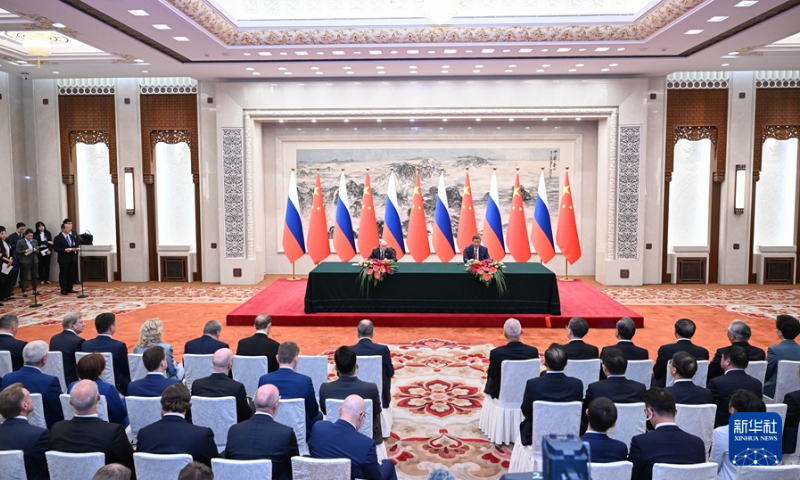







 A file photo shows the view of Sanjiangyuan National Park in China. /CFP
A file photo shows the view of Sanjiangyuan National Park in China. /CFP  An undated photo shows a Tibetan fox at the Sanjiangyuan National Park in China. /CFP
An undated photo shows a Tibetan fox at the Sanjiangyuan National Park in China. /CFP  An undated photo shows an aerial view of the Réunion National Park in France. /CFP
An undated photo shows an aerial view of the Réunion National Park in France. /CFP 
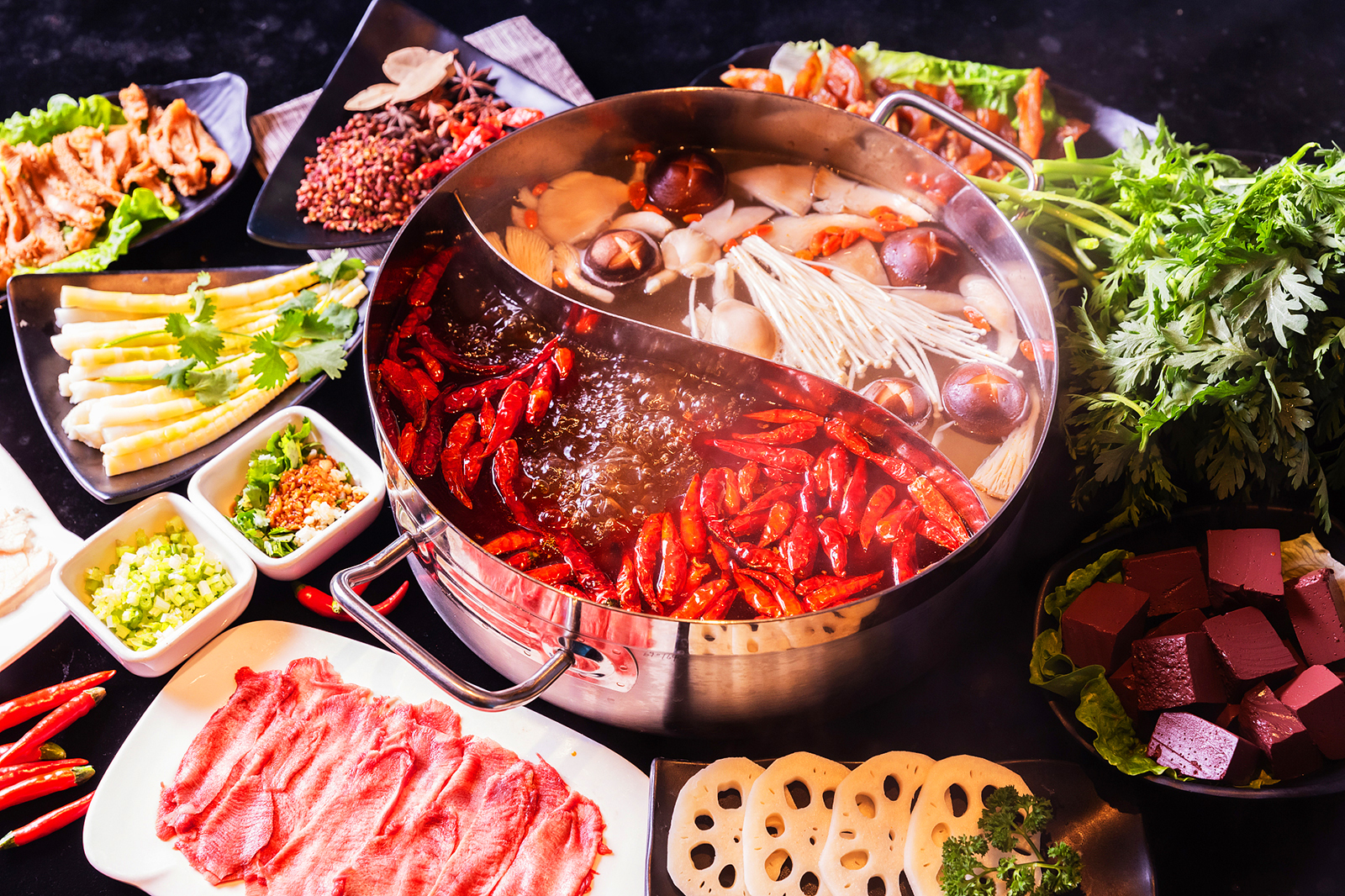 Hotpot is one of the earliest Chinese culinary styles to go global. /CFP
Hotpot is one of the earliest Chinese culinary styles to go global. /CFP 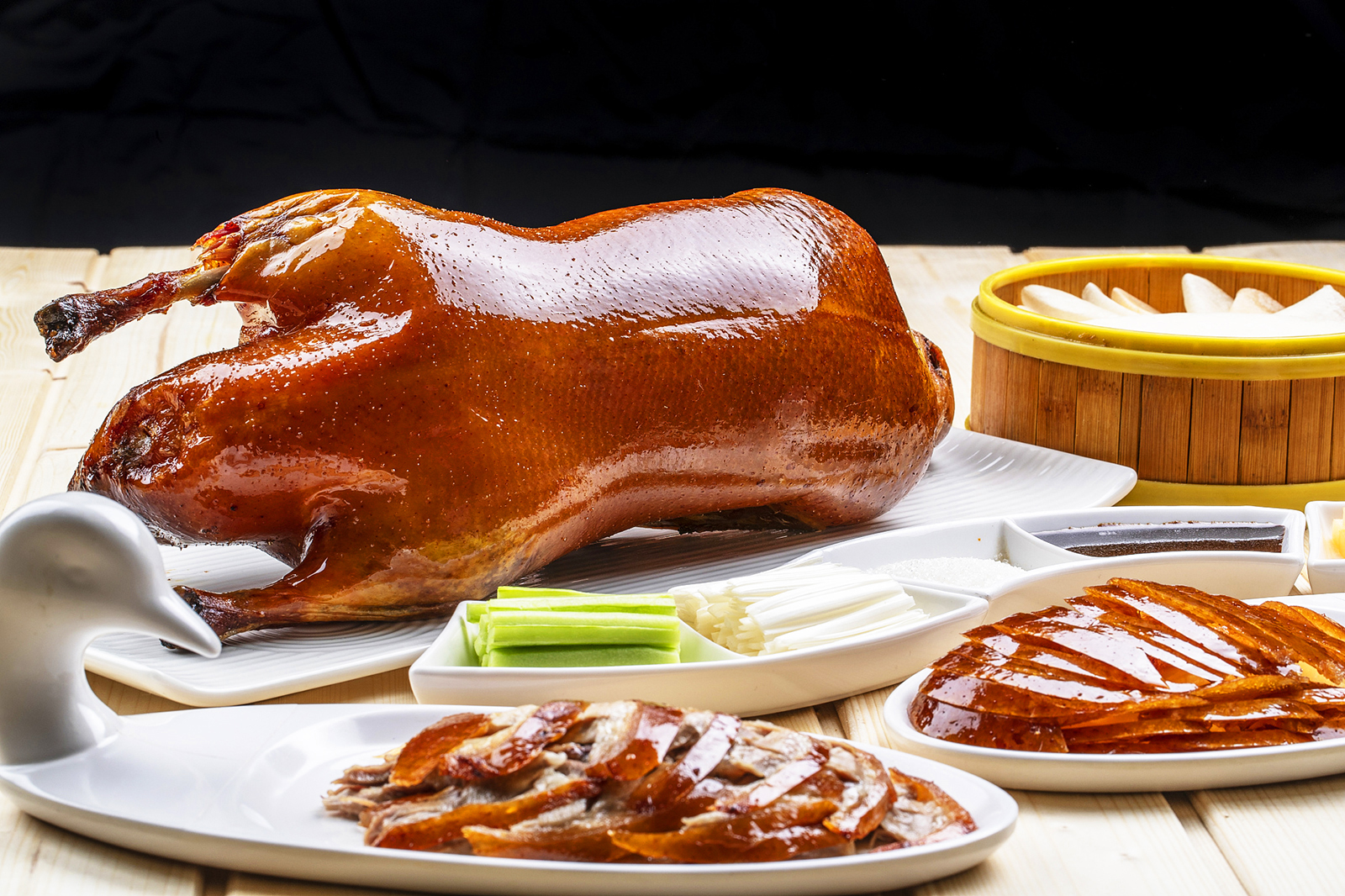 Chinese roast duck entered overseas markets decades ago. /CFP
Chinese roast duck entered overseas markets decades ago. /CFP  A store of a new-style Chinese tea beverage brand /CFP
A store of a new-style Chinese tea beverage brand /CFP  Fish head with chopped chili peppers is a famous dish in Hunan cuisine. /CFP
Fish head with chopped chili peppers is a famous dish in Hunan cuisine. /CFP  A tofu dish in Zhejiang cuisine /CFP
A tofu dish in Zhejiang cuisine /CFP 


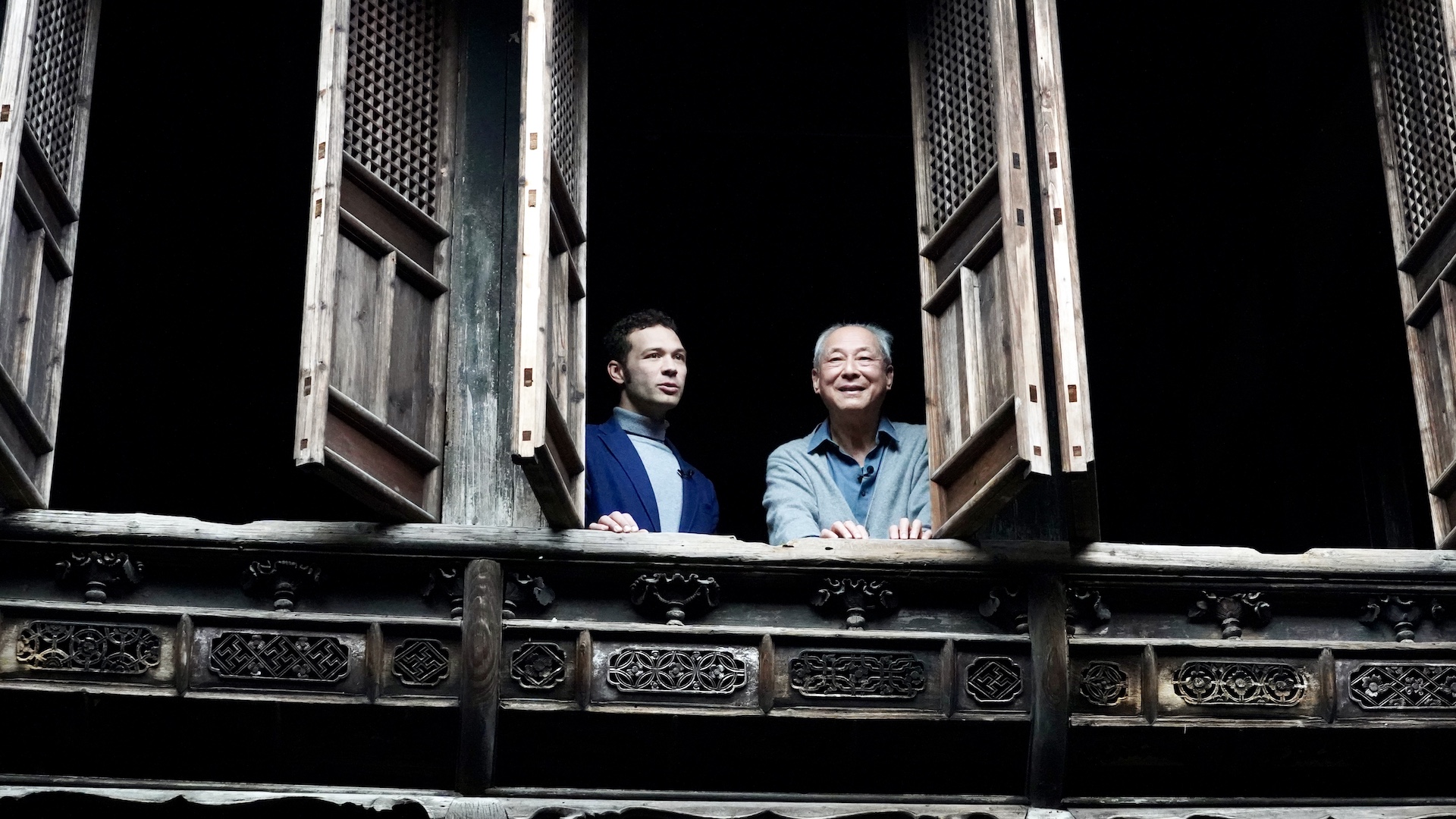

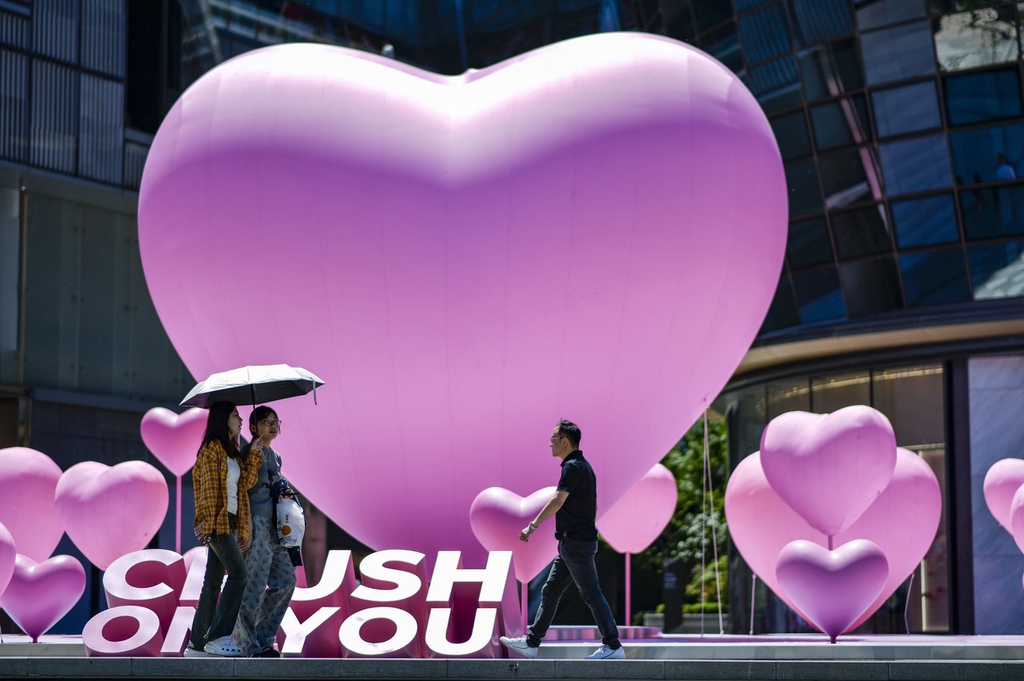 Heart-shaped balloons and a “crush on you” sign stand in a square outside a mall in Jinan, Shandong Province, May 15, 2024. /IC
Heart-shaped balloons and a “crush on you” sign stand in a square outside a mall in Jinan, Shandong Province, May 15, 2024. /IC 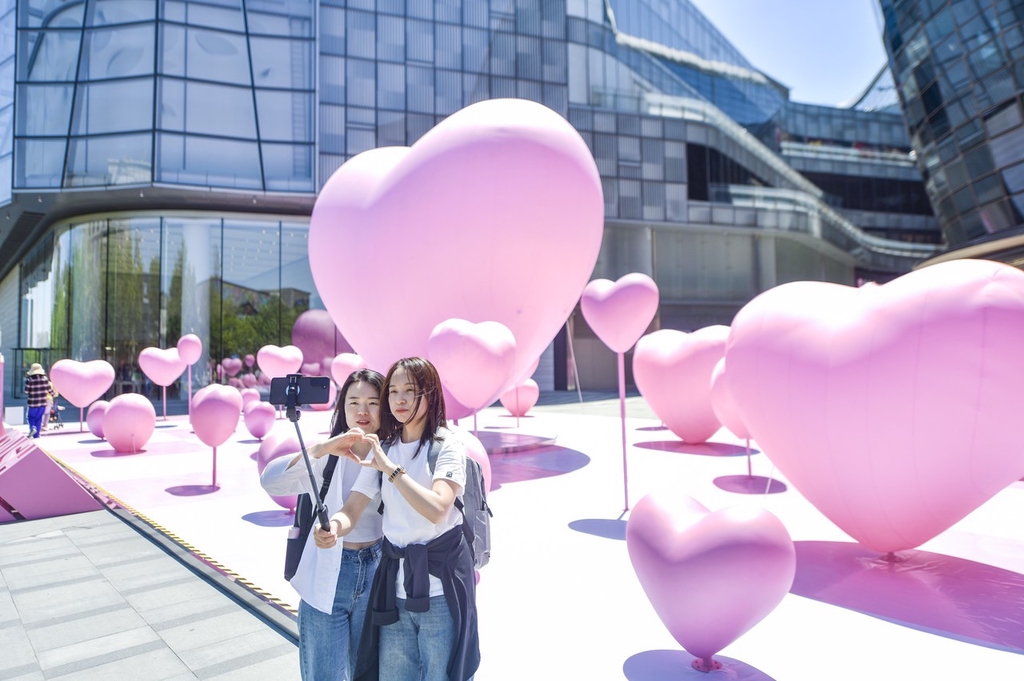 Two women take a selfie with heart-shaped balloons set up in a square outside a mall in Jinan, Shandong Province, May 15, 2024. /IC
Two women take a selfie with heart-shaped balloons set up in a square outside a mall in Jinan, Shandong Province, May 15, 2024. /IC 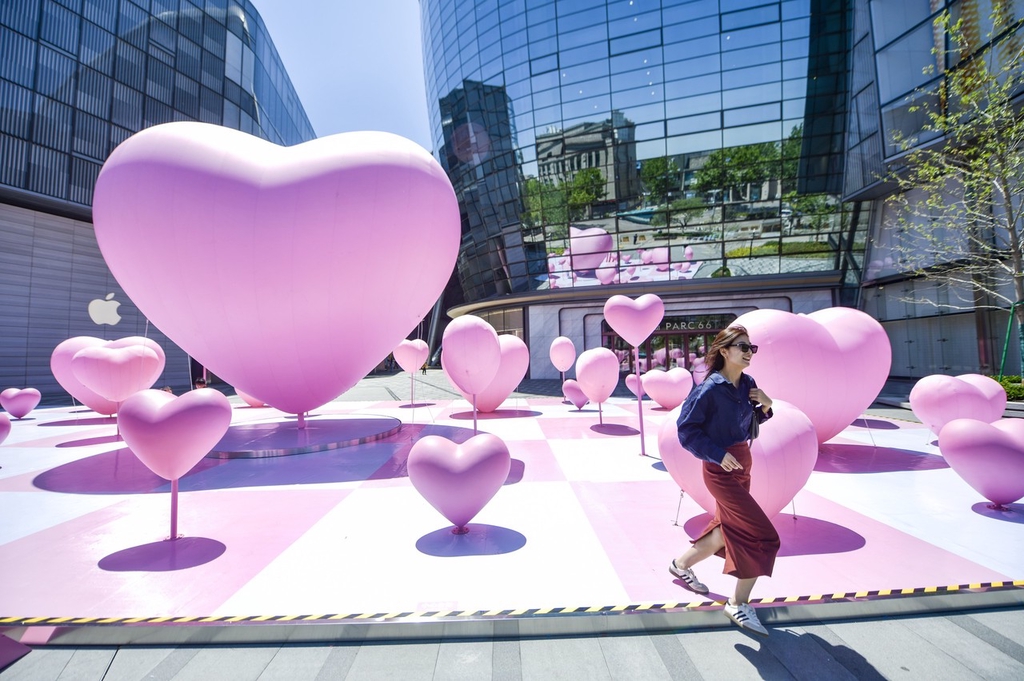 A woman walks past heart-shaped balloons set up in a square outside a mall in Jinan, Shandong Province, May 15, 2024. /IC
A woman walks past heart-shaped balloons set up in a square outside a mall in Jinan, Shandong Province, May 15, 2024. /IC 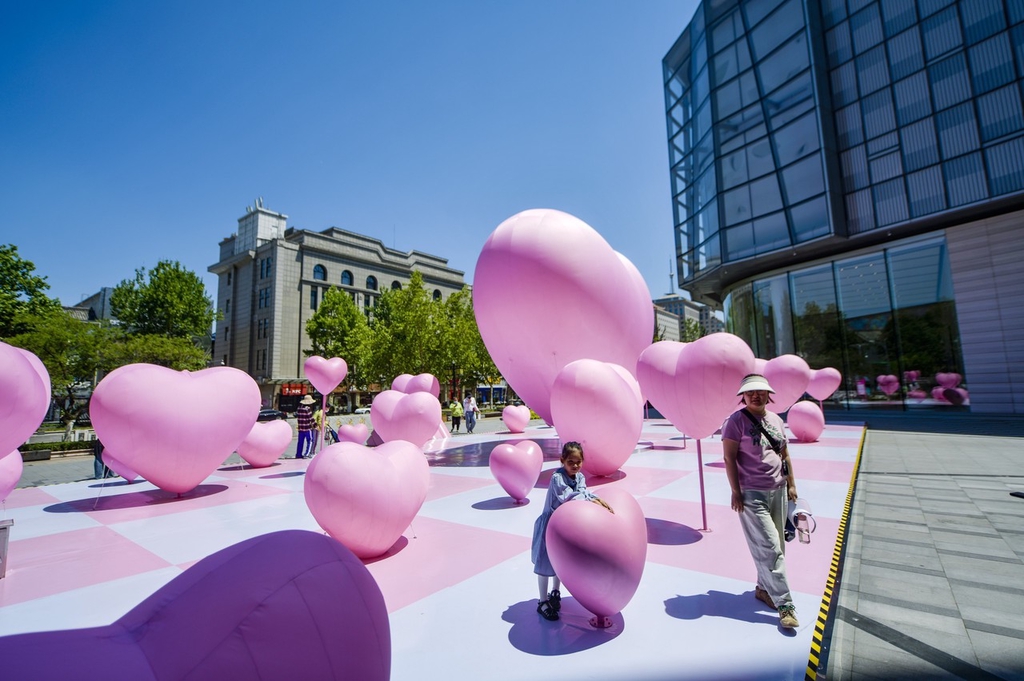 People pass by heart-shaped balloons set up in a square outside a mall in Jinan, Shandong Province, May 15, 2024. /IC
People pass by heart-shaped balloons set up in a square outside a mall in Jinan, Shandong Province, May 15, 2024. /IC 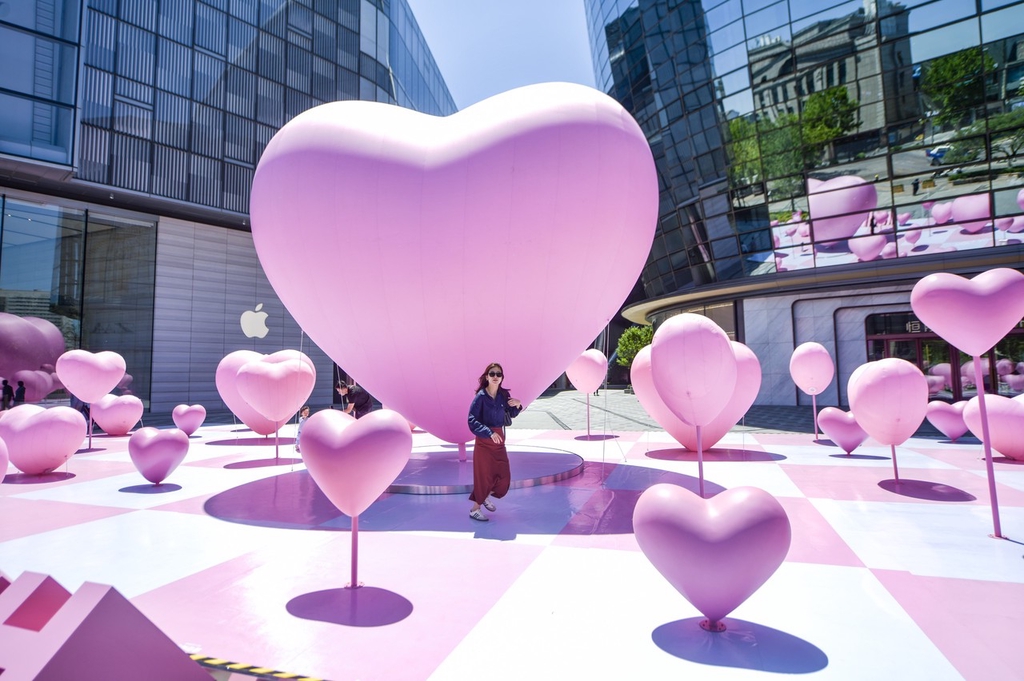 A woman passes by heart-shaped balloons set up in a square outside a mall in Jinan, Shandong Province, May 15, 2024. /IC
A woman passes by heart-shaped balloons set up in a square outside a mall in Jinan, Shandong Province, May 15, 2024. /IC